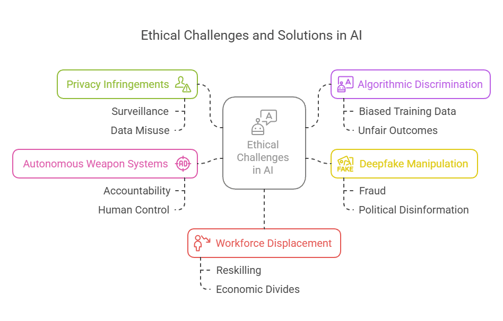Ethical AI Development
The Dark Side of Artificial Intelligence
While AI offers transformative potential, its unethical application poses serious risks to privacy, security, and societal trust. From deepfake scams to biased algorithms, the irresponsible deployment of AI can cause significant real-world harm—underscoring the urgent need for ethical oversight and global safeguards.
Key Ethical Challenges in AI
Privacy Infringements
Pervasive surveillance, unauthorized data extraction, and the misuse of facial recognition technologies undermine individual freedoms and digital rights.
Algorithmic Discrimination
Biased training data can lead to unfair outcomes in sensitive domains such as hiring, lending, and law enforcement, reinforcing societal inequalities.
Deepfake Manipulation
Synthetic media is increasingly weaponized for fraud, political disinformation, and reputational attacks, blurring the lines between reality and fabrication.
Autonomous Weapon Systems
AI-enabled military technologies raise grave ethical and humanitarian concerns, particularly in terms of accountability and human control.
Unmanaged Workforce Displacement
The automation of jobs, without parallel efforts in reskilling or support systems, threatens livelihoods and widens economic divides.
Addressing Unethical AI Use
Stronger Legal Frameworks
Enforce transparency and accountability, as seen in legislative efforts like the EU AI Act.Ethical AI Standards
Promote principles such as fairness, explainability, and human oversight in AI design and deployment.Bias Detection and Mitigation
Conduct regular audits to identify and address discriminatory outcomes in AI systems.Digital Literacy and Public Awareness
Equip users with knowledge about AI risks, data privacy, and informed digital consent.Whistleblower Protection
Safeguard those who expose unethical practices within AI development and deployment ecosystems.
A Call for Responsible AI Innovation
To harness AI’s benefits while avoiding its pitfalls, innovation must be guided by ethics, human rights, and public interest. The interplay between technology and diplomacy is becoming increasingly vital—highlighting the role of tech diplomacy in shaping global norms and collaboration.
In a world where digital sovereignty depends on resilient digital infrastructure, data protection, and technological autonomy, nations must assert control over their digital futures. The darker aspects of the digital age—ranging from cyberattacks and misinformation to sudden IT disruptions—present real and escalating threats to both regional stability and international security.
AI innovation must not outpace the guardrails that ensure it serves humanity. The future depends on a deliberate, inclusive, and ethical path forward.
Innovate responsibly—let ethics lead the way.




Get in touch



Ethical AI is crucial for protecting privacy and ensuring technology benefits society without causing harm.
Alex Smith

Strong safeguards and ethical standards are essential to prevent misuse of AI and protect our future.
Jordan Lee

★★★★★
★★★★★
Get in touch
83 Watsonbrook Dr. Brampton, L6R 0R5, ON, Canada
contact@aidoctrine.com
Shahed Tower, 10 Floor, Mirgab, Kuwait city, Kuwait
